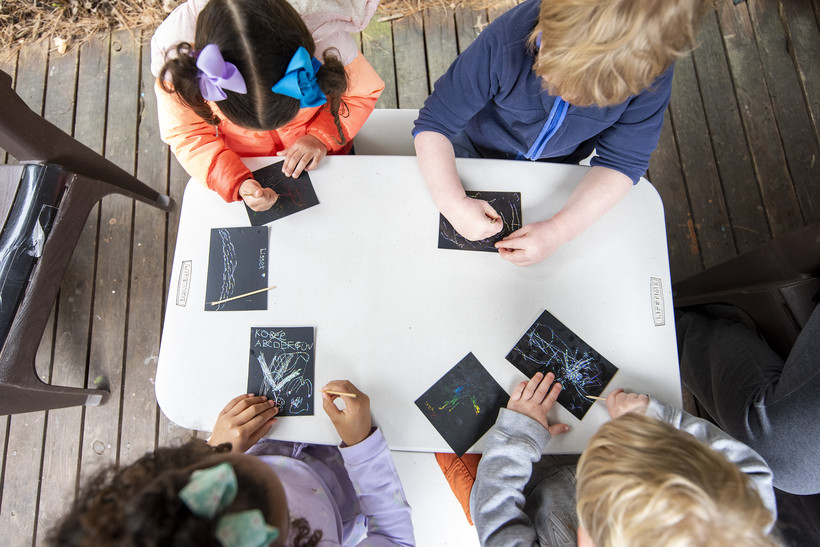State Ranks High in Pre-School Access
But dropped from 3rd to 7th best during pandemic last year, national study finds.

Children at Sunshine Family Daycare work on a craft at a table Monday, May 10, 2021, in Madison, Wis. Angela Major/WPR
The COVID-19 pandemic threw a lot of curveballs at Wisconsin preschools and day care centers.
Although many of the facilities that had closed during lockdown reopened in time for the 2020-21 school year, many continued to see short-term closures due to COVID-19 exposures and teacher quarantines. Some families kept their children at home because of the pandemic, which made the financial picture more challenging for centers that usually already operate on very thin profit margins.
In addition, combined state spending on early education dropped by an inflation-adjusted $254 million, though that was offset by pandemic relief funding.
“States did a remarkable job of supporting their programs during the pandemic — helped, critically, by federal pandemic relief funds that played a key role in preserving funding levels,” said Steve Barnett, senior co-director of NIEER. “Unfortunately, funding remains far short of what’s needed for high-quality, full-day programs.”
According to NIEER’s report, Wisconsin ranks seventh in the country for access to free preschool programs for 4-year-olds, with 56 percent of the state’s 4-year-olds enrolled. That’s down from its third-place finish last year.
The state has far lower rates of enrollment in 3-year-old kindergarten, enrolling less than 1 percent of the state’s 3-year-olds and ranking 34th in the country.
Malaika Early Learning Center is an early childhood education center on Milwaukee’s north side that serves children from infancy through third grade. Malaika is currently thriving, by many metrics. It’s had lower turnover than feared even as staff turnover in preschools and day cares has been high. It also recently expanded to serve first through third grade as well. It was also just was named a child care partner for ThriveOn King, an initiative to improve equity and well-being in the Harambee, Halyard Park and Brewers Hill neighborhoods.
Still, Johnson said the pandemic brought difficulties for her center. Especially in the early days of the pandemic, she said she had a lot of sleepless nights trying to figure out how to cover teachers’ salaries and center’s overhead costs when they were closed. Even now, one of the preschool classrooms is closed because they don’t have the staff to open it.
“I think it became, for some folks, unbearable circumstances to be on pins and needles and worry about your health every day,” she said. “At the end of the day, you can have people who are extremely passionate about the care, but they also need to think about themselves and their families.”
Before the pandemic hit, Wisconsin was moving toward full-day 4K programs. Though the state hasn’t established statewide full-day requirements, some school districts picked up the baton. Madison, for example, is planning to extend its full-day 4K next school year.
Wisconsin also met only three of 10 quality benchmarks laid out by NIEER, falling short on their recommendation that class sizes max out at 20 students and the student-teacher ratio be 1 to 10, among others. It wasn’t alone in that respect — 40 percent of pre-K programs around the country met less than half of NIEER’s benchmarks.
When it comes to the 4-year-olds, Wisconsin has a high rate of preschool attendance built into its founding — free, voluntary schooling for 4-year-olds was written into the state’s constitution in 1848.
U.S. Secretary of Education Miguel Cardona said the federal government is pushing for more investments in early education. The Build Back Better plan, an initiative set out by the Biden administration, called for child care spending to be capped at 7 percent of a family’s income. The plan didn’t make it through Congress, but many are still pushing for those programs.
“Even if we fully rebound, we’re not where we need to be,” said Cardona. “It’s unacceptable to go back to where we were in March 2020. Our littlest learners need more.”
Johnson, at Malaika in Milwaukee, said strong federal investment will set the tone to better support centers like hers.
“How do we keep that at the forefront of every legislative agenda, over and over again?” she said. “To keep things like that at a federal level, then it has no choice to trickle down to the states.”
Listen to the WPR report here.
Wisconsin drops in 4K access in 2020-21 ‘State of Preschool’ report was originally published by Wisconsin Public Radio.





















